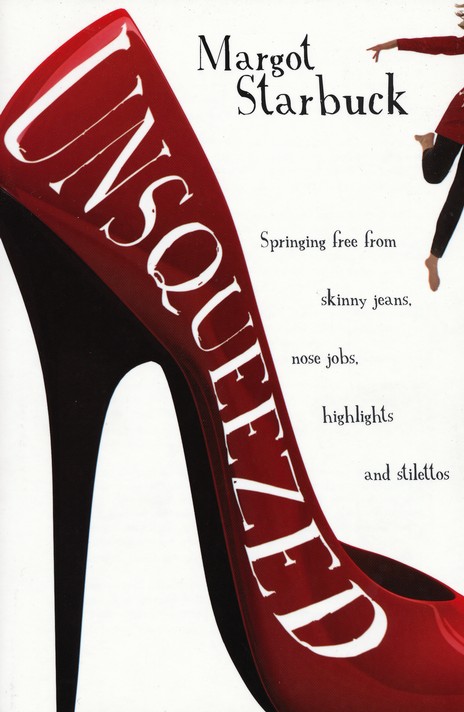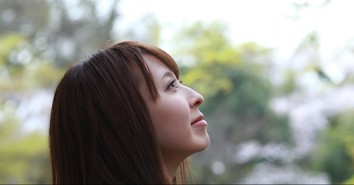A Fresh-Squeezed Take on Body Image from the Author of Unsqueezed

What do you see when you look in the mirror? The outside or the inside? The new creation in Christ, or the old human? Imperfections, or purposed usefulness?
What do you see when you look at the television or a magazine? Shrinking boundaries of beauty? More challenges you'll never be able to meet? Outright lies?
All of the above can have a constricting, squeezing effect on (not just) women in (not just) America, not unlike the frustration of trying to squeeze into those designer jeans that are two sizes too small.
Body image books have been written and reported on before, but we sat down with the delightfully quirky Margot Starbuck (M.Div., Princeton Seminary), who has written a book with the title and goal of getting you Unsqueezed. As you'll see, Margot attacks the body image issue from the unique perspectives of discipleship, disability, doing life with friends, and defining what bodies are truly for…
Crosswalk.com: Why are women so predisposed to seeing flaws when they look in the mirror, including women who are new creations in Christ or would claim to know that God looks at the heart?
Margot Starbuck: That's a great question. I think even though we know in our heads and our hearts that we are new creations, we live in this culture in which we're bombarded by images of "the perfect woman." I feel like we live in that tension between what we believe, and the reality of being squeezed by the impact that these images have on us.
So when we begin to deal with those images, and we ask ourselves questions like, "Is this really me?" people come up with all sorts of solutions - plastic surgery, for example. Are these solutions ever answers? Is it different for each person? What do you think?
I think that the little voices that hisses, "There's something inherently wrong about you," is often followed by the Deceiver's whisper, "There's something you can do to be acceptable, there's something you can grasp or purchase to finally be acceptable."
And I think what discipleship looks like is living in trust that God will meet our needs, and I think that we err when we decide to take things into our own hands, to satisfy ourselves, to soothe ourselves with all of these "other" options. It feels to me like Jesus' encounter with Satan in the wilderness, where's he's offered this array of possibilities but finally says, "I will trust in what God provides." And I think that's what the path of discipleship looks like for us as well.
You've done work with the disabled. How has that work informed the themes you cover in Unsqueezed?
As I began to think about bodies, the first thing I wanted to say is that bodies were given by God for function. And in my mind I was trying to make a distinction between that idea and our culture's insistence that bodies were made to be viewed, [which stands in] opposition to the understanding that God gave us bodies to love and serve others.
But as I was thinking about it, I realized that anything which I say about bodies and the reason God gives bodies also has to be true for my friends with disabilities! And that really helped me. All of a sudden it couldn't be just about function anymore - although that's important. But that's how I came to the realization that bodies really are given for relationship.
I'm thinking of a teenage friend whose body is severely compromised, and yet it's that body which allows him to be in relationship with other people. So in that respect, his body is good because he's able to be in relationship.
You use humor in several of the stories you tell in the book. Can you give us an example of how humor - seeing things with a laugh or a smile - can help someone change how she sees herself?
Oh, yeah! That's been part of my personal journey. I just can't take myself too seriously! There are these things that I believe about what bodies are for, what God gave them for, and then all of a sudden I'll see myself doing something particularly nutty. In fact, as I was getting ready to come to this conference…
I had traveled a few weeks ago, so all of my favorite clothes that I wanted to wear here and look so special, I put them in the washing machine with this bright red jacket… and everything came out pink!
I'm glad to know I'm not the only one.
Yeah! I just had to say to myself, this is perfect as I'm preparing to speak about how unimportant appearances are. It just made me laugh that this outfit that I had literally imagined wearing for months was just gone, destroyed.
I think that as women can talk about these things and agree together how silly some of it is… like some of the commercials for shampoos and hair conditioners that show the split ends, and all the molecules?
Under a microscope, right?
Exactly! People, these are ends, they don't even do anything! So I think that as we have those conversations, we can help set one another free from some of the silliness that's marketed to us.
Is there anything wrong with wanting to look your best?
[Sighs]… That's a great question. As I was doing this thinking and dreaming [in preparation for the book], I originally wanted to say, "Appearances are not important at all."
But I was kind of pushed by a friend, who said, "Really? Because…" - whatever it is for me, you know, with the tie-dye, or the beads or whatever - "it looks like you do put a bit of time and energy into your own appearance." So, I was challenged. And I realized that where it goes bad is when we become obsessed with this preoccupation with ourselves.
So no, I don't think there's anything wrong with looking good, with appearing attractive. Where we go astray is with self-preoccupation. An example would be a businesswoman who pulls out her credit card in Nordstrom's but is done with it in 15 minutes might spend less time and energy on her appearance than I do at my thrift stores looking for the perfect accessory to go with this or that. So I think that when we look at the time and the resources that we pour into ourselves, that's a pretty good barometer of how we're doing.
And it's applicable to so many things when it becomes about us. You've already touched on the fact that you want to help people discover why God gave us bodies. So can you finish that sentence for us? "God gave us bodies because __________."
Yes, I really believe that God gave us bodies to love God and love other people. I think we see that most clearly in the person of Jesus. Jesus is the visible image of God, and I know that's not supposed to be literal, and yet we can really see who we're supposed to be when we look at the physical body of Jesus: when his hands feed people, when his eyes see people who aren't otherwise seen, when his ears really listen to people who aren't heard, when his knees bend in prayer. I think that that is what bodies are for, and we see it most clearly in the person of Jesus.
And then we figure out what that most looks like in our lives. It might mean shoveling for an elderly neighbor. It might mean holding a friend's baby who's got colic. Whatever it is, when we use our bodies to love God and other people, our bodies are doing what they were made for.
How has your journey of writing the book and discovering these themes changed you, and how can it change others?
I feel like on the journey of both living it and writing the book, I have realized the importance of doing it with a friend. When it's just me, I either get stuck in my head or fail, yet I think when we do the journey with others, we're all strengthened. For a while I had what I call a Body Buddy, I had a Hair Buddy for a while (she had sworn off $150 highlights with her hairdresser, and I knew she was going to need some support to live that out, so we became Hair Buddies)… another friend decided not to buy clothes for one year, and that had been something that had been on my heart for a while. I didn't want to do it! But when I saw her doing it I said, yeah, I want to be a part of that and do that with you.
So the support of friends on that journey has meant the world to me, and it really is what I encourage other women to be about. Because in the end? What we consume - where our attention is with what we eat, what we buy, what we wear - is a matter of discipleship. To me that's exciting that there are these very practical ways in which we can live out discipleship with one another.
For some practical applications from Unsqueezed: Springing Free from Skinny Jeans, Nose Jobs, Highlights and Stilettos, see our article "Use Your Body the Way God Designed It," by Whitney Hopler.

Publication date: July 16, 2010
Originally published July 16, 2010.




